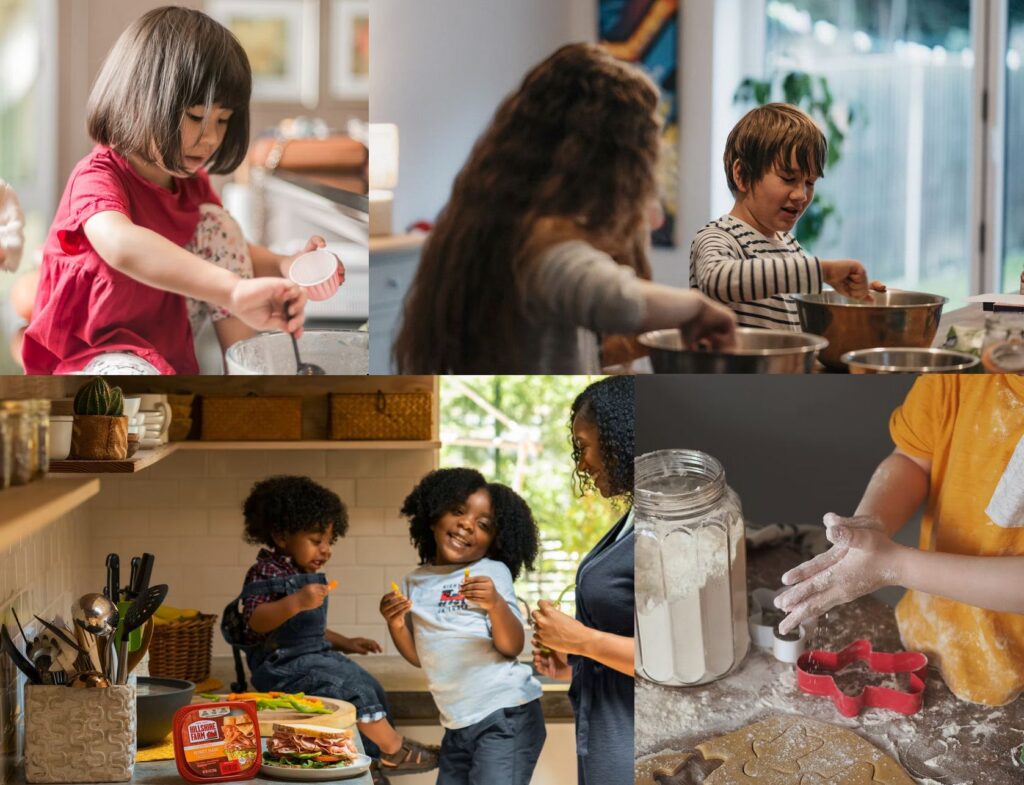The kitchen is no place to fool around; there’s a risk of getting injured or badly burned. Parents can set rules for kitchen behavior while kids are young.
There’s no time like the present to begin teaching your young child kitchen safety rules, including how to behave when cooking. If you have a teen or young person taking on the responsibility of cooking once or twice (or more) a week, then you’ll want to review the old rules. Set some new guidelines if necessary, to keep your young cook focused and everyone safe.
Teaching Your Teen Cook Appropriate Kitchen Behavior
The kitchen is the main gathering point in many households, especially after school and in the evening. The laughter and sharing of the day’s events put family members in touch with one another. It’s a whole new scene, however, when an older child – a teen, usually – takes over meal preparation in the absence of one or both busy parents.
Do you have a set of kitchen rules for your children? Think about it; a little argument or horseplay between siblings (or friends that have come to hang out) could spell trouble. What does appropriate kitchen behavior mean?
- There is no horseplay, running, showing-off, or playing allowed in the kitchen.
- It means having younger siblings play in another room so that no one gets in the way or gets underfoot in the kitchen when someone is cooking or preparing food.
- Keeping pets out from underfoot, too.
- It means showing a positive attitude toward understanding and demonstrating kitchen safety rules and practices before being left alone to cook.
Follow Kitchen Safety Rules to Prevent Accidents and Injury
It’s easy to assume that older kids know how to safely work in a kitchen because they’ve seen parents doing it for years. It’s never safe to assume anything where kids are concerned. Before leaving your older child with the responsibility of preparing a meal, set some guidelines for what he or she is and is not allowed to prepare – fried foods, for example.
Here are some of the most common kitchen safety rules for cooks of all ages and all levels of experience:
- Know how to use a fire extinguisher. (Every household should have one.) Water will spread – not extinguish – a grease fire. Incidentally, if you don’t already have a family fire escape plan, then this is a good time to make one.
- If your home has a gas stove, know how to relight pilot lights for burners, and when to call the gas company (maybe 9-1-1 after hours) for emergency help. Keep utility company numbers handy.
- Keep a first aid kit in the kitchen. Know how to treat a mild burn. For a large or severe burn, laceration, or other injuries, call 9-1-1. Don’t hesitate to go to the emergency room.
- Avoid distractions while cooking: Friends, phones, video games, TV, and so on.
- Don’t use metal utensils in toasters or other electrical appliances where there’s a danger of electrical shock.
- Never allow appliance cords to dangle or obstruct walkways; never use extension cords on cooking appliances. Cords can cause falls. Young children have suffered extensive burns from pulling hot cooking appliances off a counter or table. This is the main reason why portable appliance cords are so short.
- Know the proper ways to use different kinds of knives, cooking tools, gadgets, and utensils.
Tips for Kitchen Clean Up
Cleaning up is a part of cooking. Food left out, scraps and dirty dishes left in the sink, and counters with crumbs, all can attract bacteria and bugs. Here are a few kitchen cleanup tips:
- Always put a sharp lid inside its can. The person who takes out the garbage won’t get a nasty cut from the lid should he press down on the bag.
- Doing dishes in the sink or leaving them to soak? Never leave a sharp knife in the water where it cannot be seen. You might forget it’s there later on, and the consequence could be a nasty cut that requires stitches in the ER.
- Pets may jump on counters and tables to get scraps and food left out when owners are away. Imagine your dog or cat licking a sharp knife blade and the injury it could cause.
- Clean up immediately any spills that could cause falls.
Today’s busy, active families can’t always share meals together. Parents may have to rely on older children to prepare a few meals each week. Go over the rules and safety precautions with your responsible teen before allowing him to cook in the kitchen. The valuable instructions you pass on to your teen son or daughter may very well prevent an injury or even a tragic house fire.
| Image sources |
|---|









